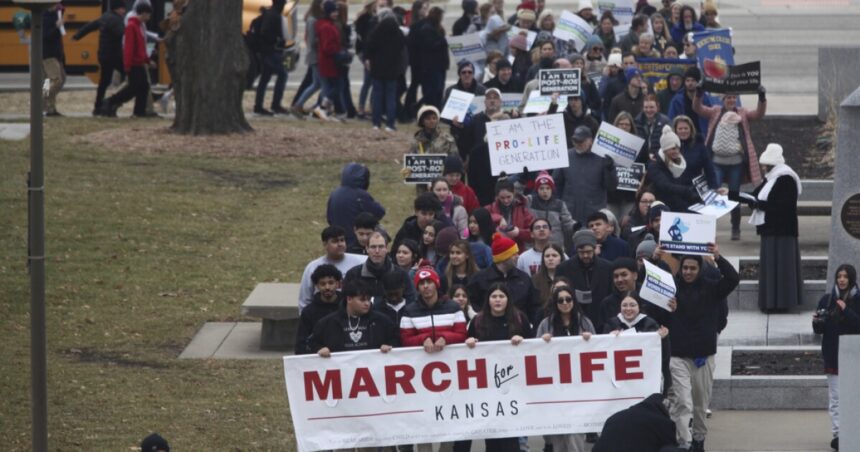Kansas’ highest court firmly restated on Friday that the state constitution protects access to abortion, invalidating a ban on a common second-trimester procedure and laws that impose stricter regulations on abortion providers compared to other healthcare providers.
The two decisions, with a majority of 5-1, suggest that other restrictions, even those in place for decades, may not hold up against legal challenges. The dissenting justice, considered the most conservative on the court, cautioned that Kansas is moving towards a legal framework of unrestricted abortion access.
“This is a significant win for the health, safety, and dignity of individuals in Kansas and the broader Midwestern region, where millions have been denied access to abortion,” said Nancy Northup, president and CEO of the Center for Reproductive Rights, which represented the abortion providers challenging the laws.
The rulings come nearly two years after a decisive August 2022 statewide vote that upheld abortion rights, following the U.S. Supreme Court’s Dobbs decision in June 2022 allowing states to ban abortion entirely. Kansas voters rejected a proposed amendment to the state constitution, introduced by the Republican-controlled Legislature, that would have denied the right to abortion.
Related story: New anti-abortion laws go into effect in Kansas despite governor’s veto
Republican Attorney General Kris Kobach argued that the 2022 vote should not impact the legality of the two laws. However, Justice Evelyn Wilson, appointed after the 2019 landmark decision, stated that the people’s vote should be respected.
“The people have spoken, and Kansas has demonstrated how a successful democracy operates,” Wilson, appointed by Democratic Gov. Laura Kelly, a strong advocate for abortion rights, wrote.
Neither of the laws invalidated by the court had been enforced due to legal challenges by abortion providers.
Additional lawsuits in state courts are challenging restrictions on medication abortions, teleconference consultations, mandatory waiting periods, and pre-procedure information for patients.
Related story: In wake of Supreme Court ruling, Biden administration tells doctors to provide emergency abortions
Friday’s rulings extend beyond Kansas, as the state has become a destination for patients from nearby states with severe abortion restrictions. According to the Guttmacher Institute, around 20,000 abortions were performed in Kansas in 2023, a 152% increase from 2020.
Abortion opponents had warned before the 2022 vote that maintaining the state constitution unchanged would jeopardize longstanding restrictions implemented by past Republican administrations. Kansas saw a wave of new restrictions under GOP Gov. Sam Brownback from 2011 to 2018.
“Unfortunately, many Kansans were misled by assurances from the abortion industry that regulations would remain strict in our state if the 2022 amendment failed,” said Danielle Underwood, a spokesperson for Kansans for Life, the state’s leading anti-abortion organization.
Justice K.J. Wall did not participate in the rulings on Friday, while Justice Caleb Stegall dissented. In his dissenting opinion, Stegall warned that the court’s decisions could weaken its credibility for years to come.
At 22 weeks, Kansas does not generally ban abortions, but minors are required to obtain parental or guardian consent. Other regulations, such as the 24-hour waiting period, have been temporarily suspended pending legal challenges.
The health and safety regulations targeting abortion providers were established in 2011 under the premise of protecting women’s health, although evidence of improved health outcomes was not presented. Providers argued that the real intent was to force them out of practice.
Standridge, writing for the majority in the clinic regulations case, stated that there was no evidence these rules would enhance patient health and that some evidence contradicted this notion.
The other law struck down by the court aimed to ban a specific dilation and evacuation procedure, the first of its kind in the state when enacted in 2015.
Statistics from the state health department showed about 600 D&E procedures in Kansas in 2022, accounting for 5% of total abortions, with 88% occurring in the first trimester. The ban would have forced providers to use riskier and costlier alternative methods, according to the Center for Reproductive Rights.
Justice Eric Rosen, in the majority’s opinion on the ban, noted that evidence from lower courts indicated the ban would compel patients to undergo untested and potentially more dangerous procedures.





